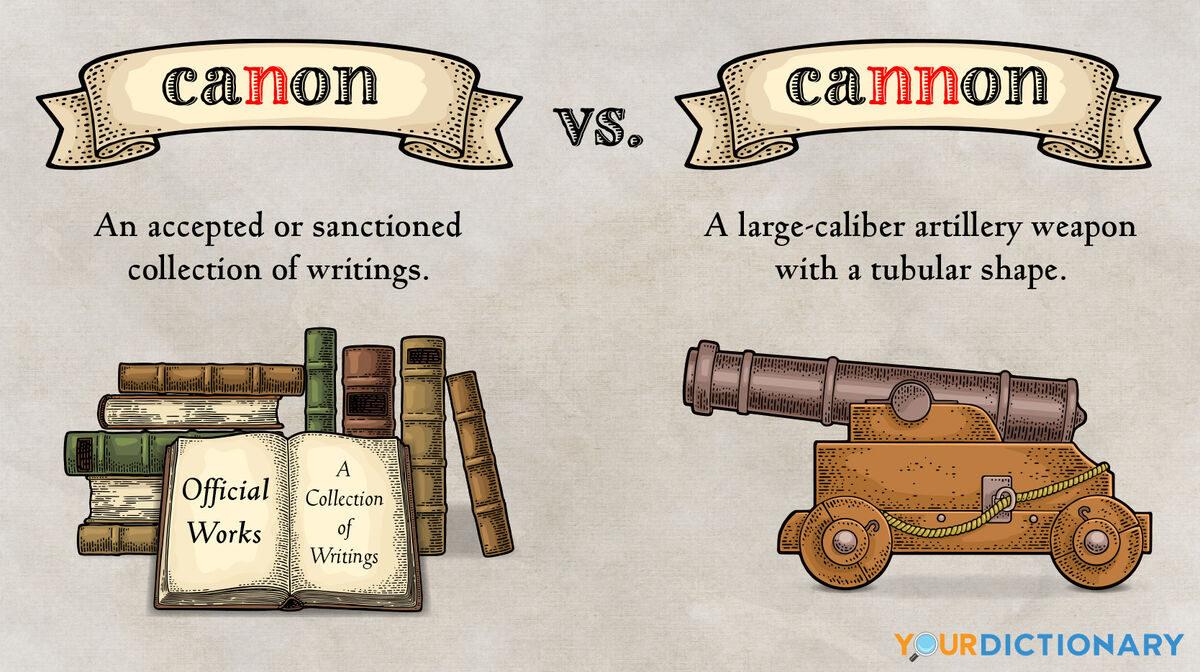
The words cannon and canon sound the same when spoken aloud and are spelled almost the same, but they do not share a common meaning. Both words are powerful terms, but they are definitely not interchangeable. It's important to clearly understand the difference between canon vs. cannon before using either of these terms in your writing.
What Does Canon Mean?
The word canon (kăn'ən) is a noun. It can mean several things. The plural form of the word canon is canons.
- church law or doctrine (The Code of Canon Law outlines the laws and principles that can be enforced within the Catholic Church.)
- collection of writings that, together, form scripture for a particular faith (The Hebrew Bible is the canon of Judaism.)
- collected works of a particular author (Shakespeare's canon is typically included in British literature classes.)
- accepted or sanctioned collection of writings (The Great Gatsby has its place in the canon of classic literature.)
- a generally accepted rule, principle, standard, or norm (The canons of judicial ethics require avoiding even the appearance of impropriety.)
- original characters specific to a particular book, series or anime franchise with their own fandom following. (Sonic the Hedgehog is an example of a canon character.
What Does Cannon Mean?
The word cannon (kăn'ən) usually functions as a noun. Its most common plural form is cannons, though it can be used as an uncountable noun, which means that the word cannon itself can be plural.
- a large-caliber artillery weapon with a tubular shape; often mounted on a vehicle, wheeled platform or aircraft (Soldiers fired cannons to protect the fortress from being breached.)
- any kind of tube-shaped device used to propel something at a high speed (During half-time at the ball game, promoters used t-shirt cannons to shoot prizes to the audience.)
- the arm of a professional athlete who can throw a ball extremely hard. (The quarterback is known not only for accuracy but also for his cannon-like arm strength.)
There are a few circumstances in which the word cannon functions as a verb.
- the act of discharging a cannon (We will continue to cannon enemy forces until they retreat.)
- in billiards or snooker, the act of hitting a cue ball so that it strikes multiple balls (The snooker player seeks to cannon as a way to gaining a competitive advantage.)
Cannon vs. Canon Easy Ways to Tell the Difference
When trying to remember the difference between cannon and canon, use one or more of these simple strategies to help you remember which word to use.
- double consonants - The words artillery and cannon both have double consonants (double "l" in artillery and double "n" in cannon). Remember that the word that describes a type of artillery is the one that also has double consonants in it.
- permission consideration - The word canon usually references a rule or commonly accepted belief. One would look to a canon to find out if something is appropriate. The word canon is the beginning of the phrase "can one." Can one do this? Can one include this? Where is the answer? In the canon.
Canon as a Brand
The word Canon is also a company name and a brand name. The companies Canon U.S.A. and Canon, Inc. make and sell a variety of digital imaging products under the brand name Canon. Their products include cameras, photocopiers, printers and more. Because company names and brand names are proper nouns, the word Canon should always be capitalized when used to refer to this business entity or its products.
Canon vs. Cannon as a Last Name
Both Canon and Cannon are used as surnames. Both words can also be used as first names. It's always important to verify the spelling of an individual's name to avoid mistakes when referring to an individual or family in writing.
- Cannon is Irish in origin. It is an anglicized name, associated with Gaelic names such as Mac Canann, Canann and ÓCanannáin.
- Canon is a variant of Cannon. This spelling is related to the Middle English word canun. It also derives from the Norman French terms canonie and canoine.
Making Sense of Commonly Confused Words
Since cannon and canon sound exactly the same when spoken and are spelled almost identically, it's not surprising that it can be tough to tell the difference. Now that you have the information you need to tell the difference between these two powerful words, you'll be prepared to use the correct homophone in your writing. While you're thinking about different words that sound the same, review some more examples of homophones. Then, check out other C words that sound similar like council vs. counsel. This will empower you to differentiate between other commonly confused words in the English language.